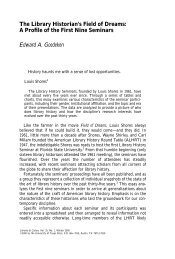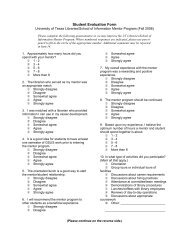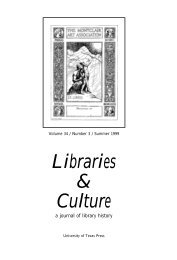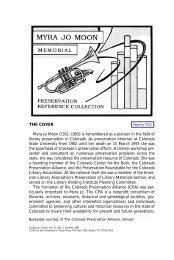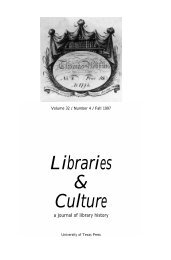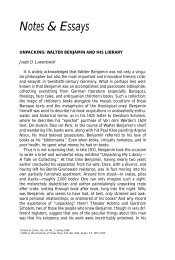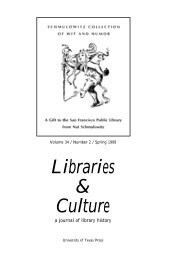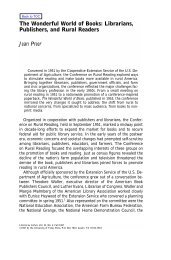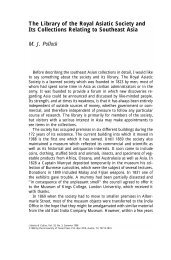Full issue (pdf file, 973 kb) - School of Information - The University of ...
Full issue (pdf file, 973 kb) - School of Information - The University of ...
Full issue (pdf file, 973 kb) - School of Information - The University of ...
You also want an ePaper? Increase the reach of your titles
YUMPU automatically turns print PDFs into web optimized ePapers that Google loves.
Henry L. Cecil and Willard A. Heaps’s <strong>School</strong> Library Service is a useful<br />
starting point. 85 Margaret I. Rufsvold’s History <strong>of</strong> <strong>School</strong> Libraries in the<br />
South is also helpful but badly dated. 86 So is Frederic D. Aldrich’s <strong>School</strong><br />
Library in Ohio. 87 Harriet Long covers the history <strong>of</strong> public library service<br />
to schools; a smattering <strong>of</strong> scholarly articles helps fill in a few gaps. 88<br />
Expertise<br />
Under this heading I include literature that covers the history <strong>of</strong> cataloging<br />
and classification, public services (including reference), collection<br />
development, and library appliances and technology. Most <strong>of</strong> the literature<br />
lacks cultural context; little <strong>of</strong> it draws from relevant conclusions<br />
that emanate from the secondary literature <strong>of</strong> social and intellectual<br />
American history.<br />
Cataloging and classification have the richest historical literature<br />
in the area <strong>of</strong> library expertise. Staple fare includes the works <strong>of</strong><br />
W. C. Berwick Sayers and Leo Montagne, which in part laid the groundwork<br />
for John Comaromi’s landmark study <strong>The</strong> Eighteen Editions <strong>of</strong> the<br />
Dewey Decimal Classification. 89 But Comaromi’s work was not definitive;<br />
debate about the origins <strong>of</strong> Dewey’s classification continues. 90 Historians<br />
<strong>of</strong> classification will also find useful two sourcebooks, one on cataloging,<br />
the other on subject analysis. 91 Fran Miksa’s monumental Subject in the<br />
Dictionary Catalog from Cutter to the Present updates Julia Pettee’s Subject<br />
Headings and should be the definitive history on that subject for some<br />
time to come. 92 Miksa also covers the development <strong>of</strong> the Library <strong>of</strong><br />
Congress classification scheme in a briefer piece. 93 Donald Lehnus and<br />
John Comaromi analyze book numbers in separate works, while Jim Ranz<br />
chronicles the history <strong>of</strong> the printed book catalog in eighteenth- and<br />
nineteenth-century American libraries. 94 No area in the practice <strong>of</strong><br />
librarianship has been more affected by automation than cataloging and<br />
classification, and no organization has had a greater impact on this area<br />
<strong>of</strong> library expertise in the past quarter century than OCLC. For a<br />
historical discussion documenting this impact, OCLC, 1967–1997 is<br />
helpful. 95<br />
Sam Rothstein’s Development <strong>of</strong> Reference Services through Academic<br />
Traditions superseded Louis Kaplan’s Growth <strong>of</strong> Reference Service in the United<br />
States from 1876 to 1891, but both are now badly in need <strong>of</strong> updating. 96 So<br />
is Scott Adams’s Medical Bibliography in an Age <strong>of</strong> Discontinuity, which<br />
covers a literature whose format and organization have changed rapidly<br />
in the last decades <strong>of</strong> the twentieth century. 97 Klaus Musmann provides<br />
an anecdotal history <strong>of</strong> technological innovations in library services<br />
between 1860 and 1960; Barbra Higginbotham adequately covers the history<br />
<strong>of</strong> library preservation between 1876 and 1910. 98<br />
17



